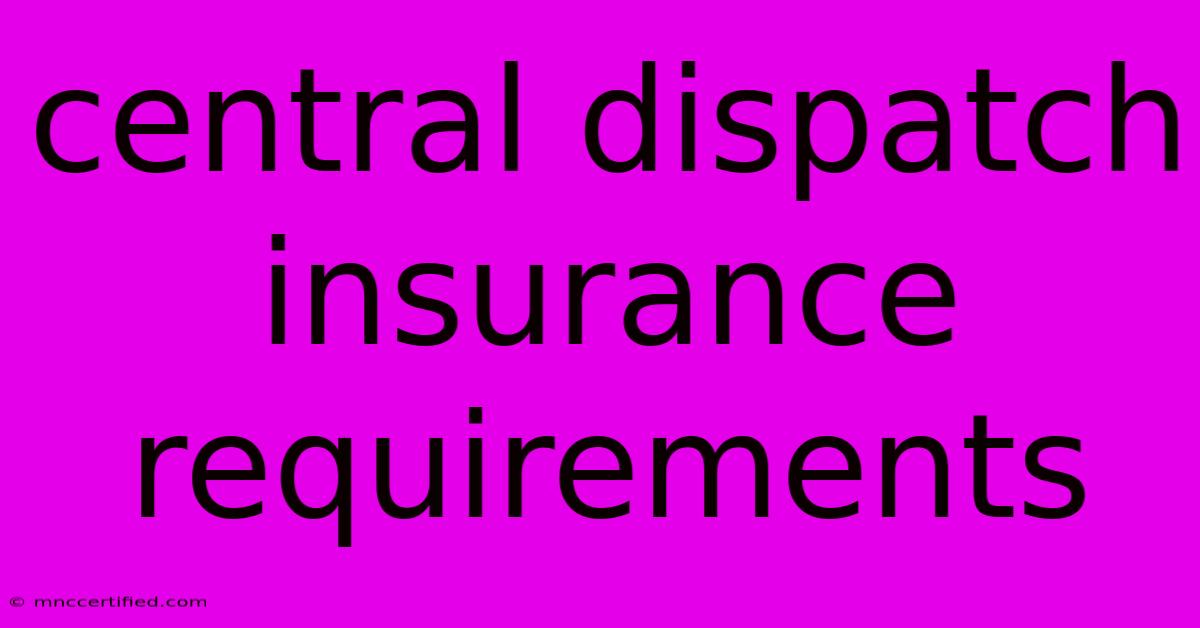Central Dispatch Insurance Requirements

Table of Contents
Central Dispatch Insurance Requirements: A Comprehensive Guide
Operating a central dispatch business requires navigating a complex web of insurance requirements to protect both your company and your clients. This guide will outline the essential insurance policies needed for your central dispatch operation, ensuring you're adequately covered and legally compliant.
Understanding the Risks of Central Dispatch
Central dispatch businesses act as intermediaries, connecting drivers with loads. This role exposes you to unique liabilities, making comprehensive insurance coverage crucial. Here are some key risks your business faces:
- Liability for Driver Actions: As you connect drivers to loads, you could be held liable for their actions on the road, including accidents, cargo damage, or even criminal offenses.
- Negligence in Load Matching: If you fail to properly match drivers with loads, leading to accidents or cargo damage, you could be held responsible.
- Data Breaches and Privacy Concerns: You handle sensitive client and driver information, making data breaches a significant threat.
- Employee-Related Issues: You might face legal issues related to employee negligence, harassment, or discrimination.
Essential Insurance Policies for Central Dispatch
To mitigate these risks, you need a robust insurance plan encompassing the following:
1. Commercial General Liability (CGL) Insurance
CGL is the cornerstone of any central dispatch insurance plan. It provides protection against claims arising from bodily injury, property damage, and advertising injury caused by your business operations.
- Examples:
- A driver injures a pedestrian while transporting a load you assigned.
- A shipper suffers property damage due to a driver's negligence.
- A client alleges defamation by your company in advertising.
2. Commercial Auto Liability Insurance
This policy covers your liability for bodily injury or property damage caused by your company vehicles or the vehicles of drivers you dispatch. It's essential even if you don't own any vehicles directly.
- Examples:
- A driver you dispatched causes an accident while transporting goods.
- Your company vehicle is involved in an accident while on company business.
3. Workers' Compensation Insurance
If you have employees, workers' compensation insurance is a legal requirement in most states. It covers medical expenses, lost wages, and other benefits for employees injured or sickened on the job.
- Examples:
- An employee sustains an injury while working in your office.
- An employee develops a work-related illness due to exposure to hazardous materials.
4. Professional Liability Insurance (Errors & Omissions)
Also known as E&O insurance, this policy protects your business from financial loss arising from professional negligence or errors in your services.
- Examples:
- You mistakenly assign a driver to a load that exceeds their driving capacity.
- You provide inaccurate information about a route, leading to a driver getting lost and incurring extra expenses.
5. Cyber Liability Insurance
This policy protects your business against financial losses arising from cyberattacks, data breaches, and other online security incidents.
- Examples:
- A hacker steals your client's data, leading to identity theft and financial losses.
- A ransomware attack disrupts your operations and causes significant financial damage.
6. Cargo Insurance
While not always mandatory, cargo insurance protects your business against financial losses due to damage or theft of goods in transit. This coverage is usually handled by the shipper, but it's crucial to understand its implications for your business.
- Examples:
- A load you dispatched is damaged during transit due to an accident.
- A load is stolen from a truck driver you assigned.
7. Umbrella Liability Insurance
Umbrella liability insurance provides additional coverage on top of your existing policies, protecting you from significant financial losses exceeding the limits of your primary policies.
- Examples:
- A catastrophic accident involving a driver you dispatched results in multiple injuries and extensive property damage.
- A client sues your business for a large sum exceeding your other insurance limits.
Determining Your Specific Coverage Needs
The exact insurance policies you need will depend on your specific business model, operating region, and the nature of your services. Consult with a qualified insurance broker to determine the most appropriate coverage for your unique circumstances.
Tips for Maintaining Compliance
- Review your policies annually: Ensure your coverage levels remain adequate for your current operations.
- Keep accurate records: Maintain detailed documentation of your operations, including client contracts, driver agreements, and insurance policies.
- Stay informed about industry regulations: Keep abreast of changes in legal requirements and industry best practices.
- Communicate with your insurance broker: Maintain open communication with your insurance broker to discuss any changes in your business or risks.
By prioritizing comprehensive insurance coverage and staying vigilant about compliance, you can protect your central dispatch business from potential risks and maintain a strong legal standing.

Thank you for visiting our website wich cover about Central Dispatch Insurance Requirements. We hope the information provided has been useful to you. Feel free to contact us if you have any questions or need further assistance. See you next time and dont miss to bookmark.
Featured Posts
-
How Much Do Implants Cost With Insurance
Nov 08, 2024
-
Chelseas 8 0 Win Over Fc Noah Highlights Their Strength
Nov 08, 2024
-
Curt Mastio Crypto Illinois Cpa Society
Nov 08, 2024
-
Outer Banks Season 4 Part 2 Ending What Happens
Nov 08, 2024
-
Sancho Recovers Maresca Provides Update
Nov 08, 2024